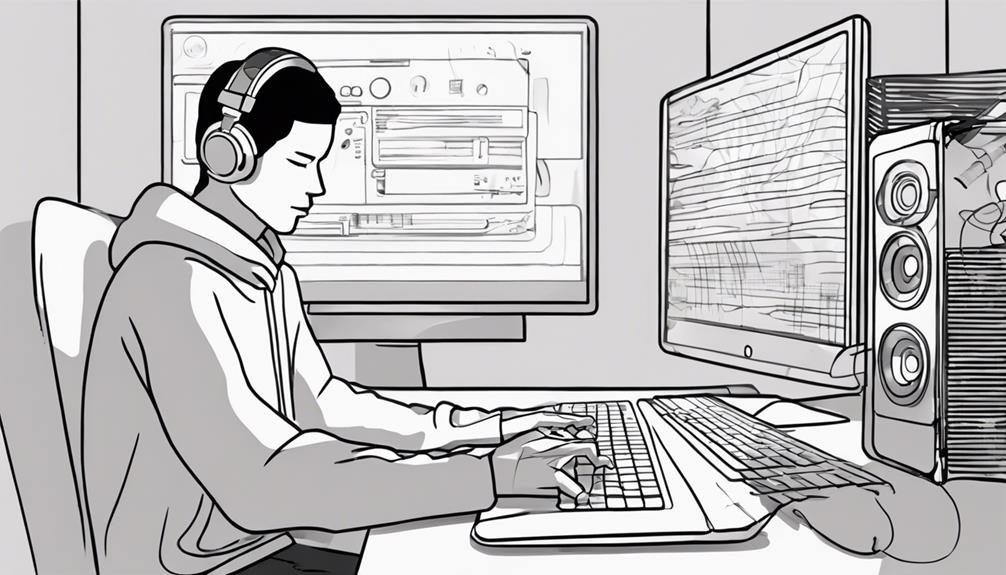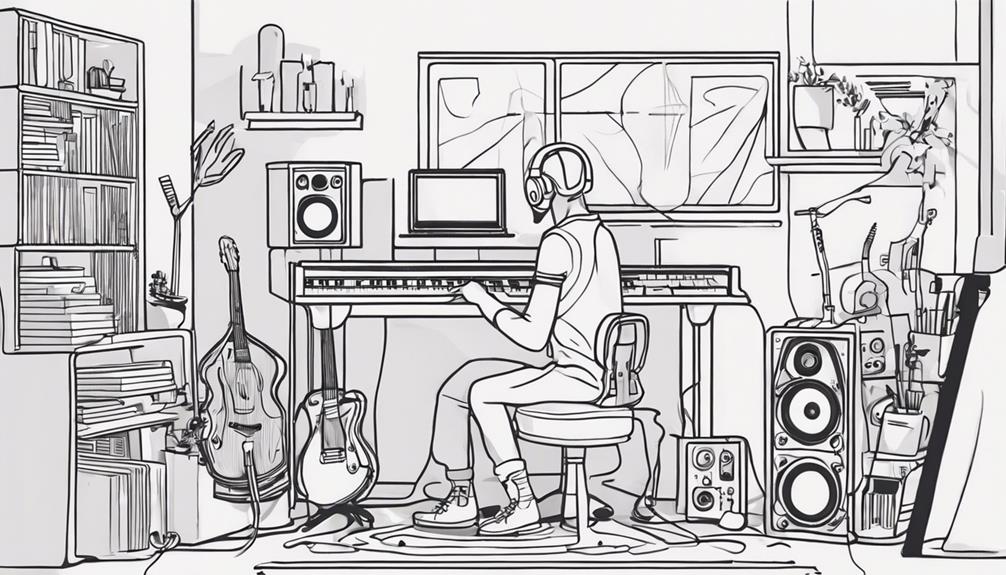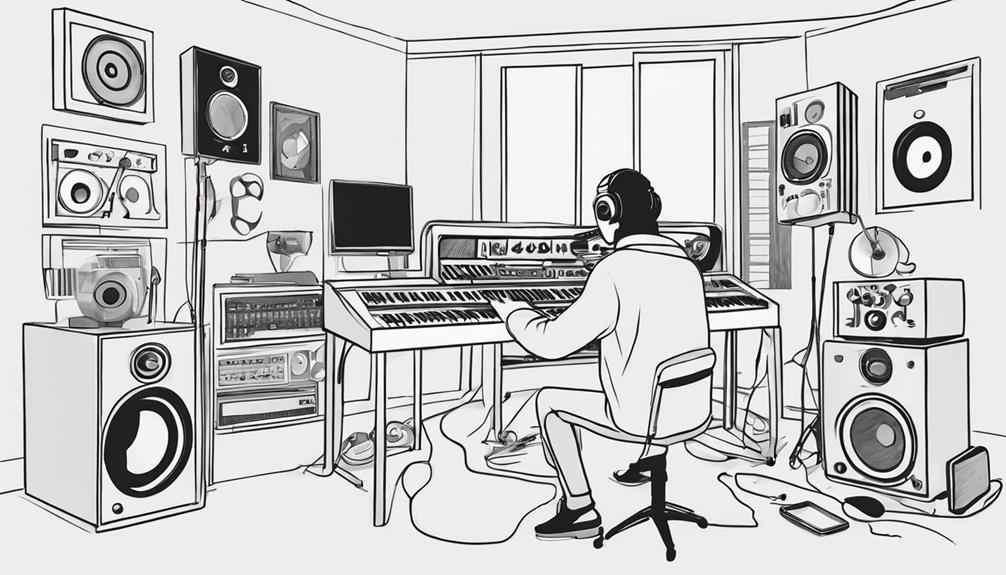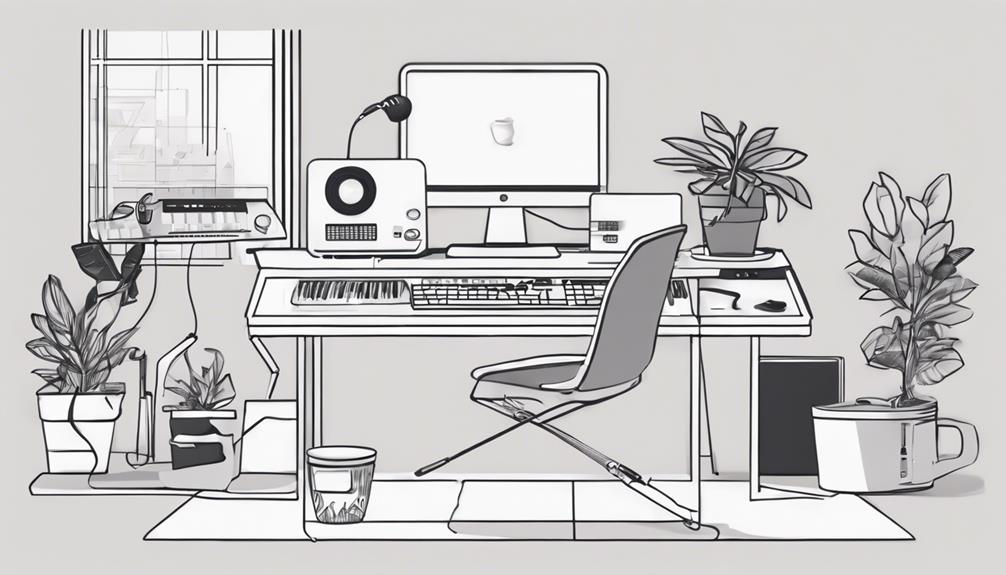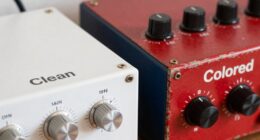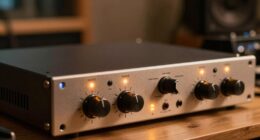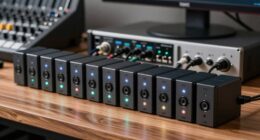Enhance your music production on a laptop by prioritizing key hardware components: Intel Core i5 or AMD Ryzen 5 processor, 8GB RAM, and SSD storage for faster data access. Look for USB-C connectivity for seamless audio interface connection. Aim for efficient cooling and peak performance for smooth multitasking. Opt for expandable SSD storage and high-resolution screens with accurate color reproduction. Invest in quality headphones or monitors with flat frequency response. Check DAW system requirements and plugin compatibility. These tips will optimize your music production workflow! Additionally, consider a laptop with long battery life to support extended production sessions without interruptions. For Apple users, explore MacBook Pro music production tips such as maximizing performance settings and utilizing Logic Pro’s native integration for a streamlined workflow. No matter your choice of device, focus on an optimized setup to bring out the best in your creativity and productivity!
Key Takeaways
- Invest in a laptop with an Intel Core i5 or AMD Ryzen 5 processor for optimal performance.
- Choose laptops with at least 8GB of DDR4 RAM for smooth multitasking.
- Opt for SSD storage over HDD for quicker data access.
- Ensure USB-C connectivity for seamless audio interface connections.
- Backup music files regularly on external SSD drives for data security.
Minimum Hardware Requirements
When considering a laptop for music production, prioritize key hardware components like the processor, RAM, and storage to guarantee peak performance. Different digital audio workstations (DAWs) such as Pro Tools, Logic Pro X, and Ableton Live have varying system requirements, but there are some general guidelines to follow.
For smooth music creation, your laptop should ideally sport a minimum of an Intel Core i5 or AMD Ryzen 5 processor. This guarantees that tasks like real-time audio processing and plugin handling run seamlessly. Additionally, aim for at least 8GB of RAM to handle multiple tracks and effects without a hiccup.
When it comes to storage, opt for an SSD over a traditional HDD for quicker data access and faster project loading times. By focusing on these core hardware elements, you set yourself up for a streamlined music production experience on your chosen DAW.
Investing in a Powerful Laptop
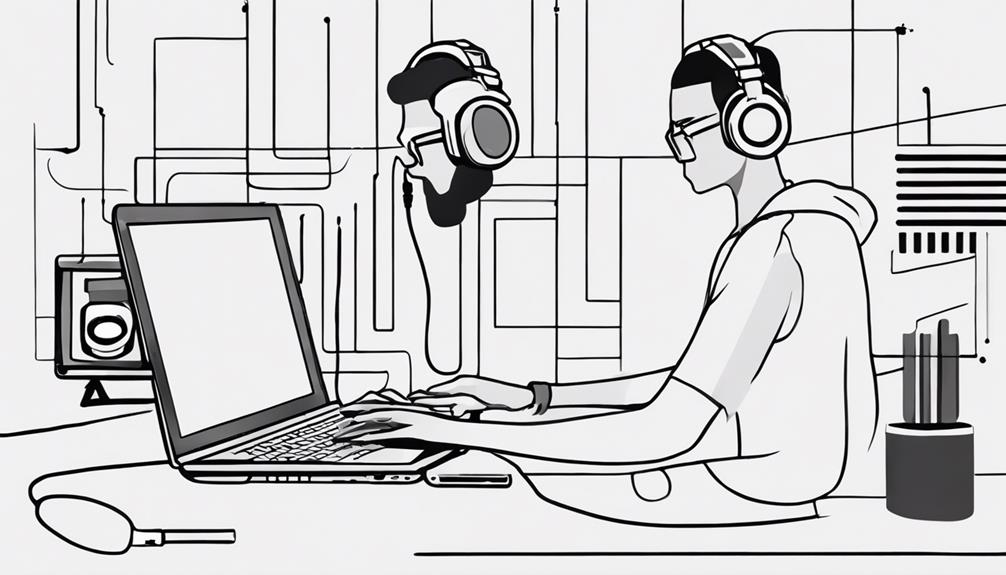
When investing in a powerful laptop for music production, prioritize models with Intel Core i5 or AMD Ryzen 5 processors, 8GB of RAM, and SSD storage. These key features will guarantee peak performance, smooth multitasking, and quick access to music files.
Additionally, look for USB-C connectivity and efficient cooling systems to support compatibility and prevent overheating during intensive sessions.
Key Performance Features
Invest in a powerful laptop with a high-performance CPU, sufficient RAM, and SSD storage for excellent music production capabilities.
When choosing a laptop for music production, prioritize these key performance features:
- High-Performance CPU: Look for laptops equipped with processors like Intel Core i5 or AMD Ryzen 5 to guarantee smooth operation while handling multiple tracks and plugins.
- Sufficient RAM: Aim for at least 8GB of RAM to support the efficient processing of audio data and software applications.
- SSD Storage: Opt for Solid State Drive (SSD) storage over traditional Hard Disk Drive (HDD) for faster data access and quicker loading times of your music projects.
- USB-C Connectivity: Ensure the laptop features USB-C connectivity to seamlessly connect with modern audio interfaces and peripherals, enhancing your workflow.
- Focus on Performance: Prioritize performance features such as CPU, RAM, and storage capacity over aesthetic design elements to maximize your laptop's music production capabilities.
Storage and Memory
For a powerful music production laptop, prioritize investing in SSD storage and sufficient RAM to support your creative endeavors effectively.
SSD storage is essential for faster data transfer speeds, necessary when handling large music files. Aim for at least 8GB of RAM to guarantee smooth multitasking and peak performance while running music production software.
Look for laptops with expandable storage options to accommodate your growing music libraries and projects. Opt for high-speed RAM like DDR4 to enhance overall system performance.
Additionally, prioritize laptops with ample storage space, ideally 256GB or more, to store your samples, plugins, and project files without worrying about running out of space.
Utilizing External Hard Drives

You can expand your laptop's storage capacity and keep your music projects organized by utilizing external hard drives. These devices provide a reliable backup solution to prevent data loss and can improve your system's performance by freeing up internal storage space.
Consider investing in an SSD external drive for faster data transfer speeds and the convenience of portability.
Storage Expansion Options
Consider incorporating external hard drives into your music production setup to expand storage capacity and enhance workflow efficiency.
When choosing external hard drives, opt for those with USB 3.0 or Thunderbolt connections for fast data transfer speeds. Additionally, look for models featuring SSD technology to improve file access and project loading times.
Portable external hard drives are ideal for music production on the go, allowing you to work outside the studio seamlessly.
Remember to regularly backup your important music production files to external hard drives to avoid any potential data loss mishaps.
- External hard drives provide additional storage space for music production projects, samples, and plugins.
- Utilizing USB 3.0 or Thunderbolt connections ensures fast data transfer speeds when using external hard drives.
- External hard drives with SSD technology offer quicker access to files and improve project loading times.
- Consider portable external hard drives for on-the-go music production work outside of the studio.
- Backup important music production files regularly on external hard drives to prevent data loss.
Backup and Organization
Utilize external hard drives to safeguard your music projects by creating organized backups and maintaining efficient file management. External hard drives are vital for backup, ensuring that your music projects, samples, and plugins are protected from potential data loss.
By organizing your files systematically on these drives, you can easily access and manage your projects without any hassle. It's recommended to opt for external hard drives with high storage capacity to accommodate large audio files and sample libraries effectively.
Regularly backing up your music production work on external hard drives is essential for ensuring data safety and preventing potential disasters. By investing in reliable and durable external hard drives, you can safeguard your valuable music projects and creative work.
Prioritize data organization and backup procedures to maintain a smooth workflow and secure your music production endeavors.
High-Resolution Screen Considerations
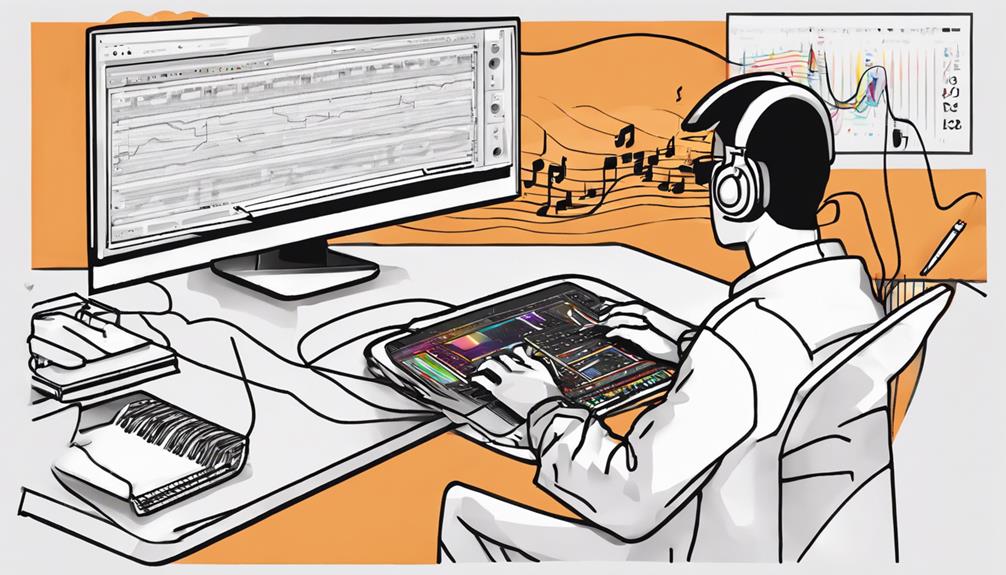
When selecting a laptop for music production, prioritize high-resolution screens to enhance visual clarity and workflow efficiency. High-resolution screens with at least 1920×1080 pixels offer better visual clarity for music production tasks.
Consider laptops with IPS panels for accurate color reproduction and wide viewing angles. Higher pixel density screens provide sharper images and text, enhancing workflow efficiency.
Touchscreen displays can offer intuitive interaction with music production software and plugins. Look for laptops with matte screens to reduce glare and reflections, improving visibility during long sessions.
These screen considerations play an essential role in ensuring that you have a smooth and productive music production experience. By opting for a high-resolution screen with the right features, you can enhance your visual experience and work more effectively with your music production software.
Importance of Good Headphones or Monitors
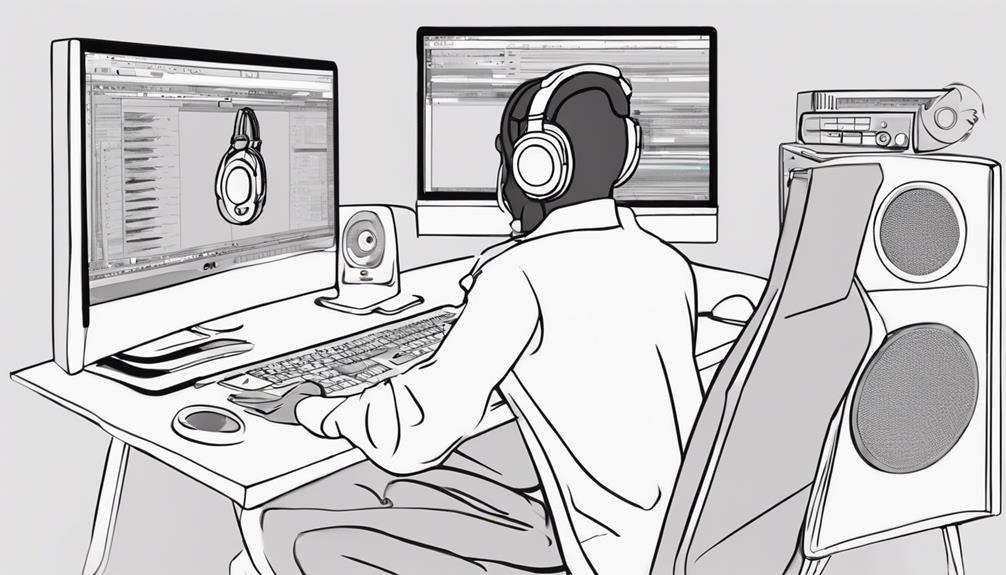
Optimize your music production setup by guaranteeing you have good headphones or monitors for accurate audio monitoring and sound production. When it comes to mixing and editing music, the quality of your headphones or monitors can make a significant difference in the final outcome. Quality headphones offer detailed and precise sound reproduction, allowing you to hear every nuance in your tracks. On the other hand, monitors provide a more spacious soundstage and better depth perception compared to headphones, giving you a different perspective on your music.
To guarantee that your audio is accurately represented, choose headphones or monitors with a flat frequency response. This will help you make more informed decisions during the mixing process. Additionally, investing in comfortable headphones or monitors is essential for long music production sessions to prevent fatigue. Check out the table below for a quick comparison between headphones and monitors:
| Aspect | Headphones | Monitors |
|---|---|---|
| Sound Detail | Precise | Spacious |
| Frequency Response | Flat | Flat |
| Comfort | Good for mobility | Better for long sessions |
Ensuring Software Compatibility
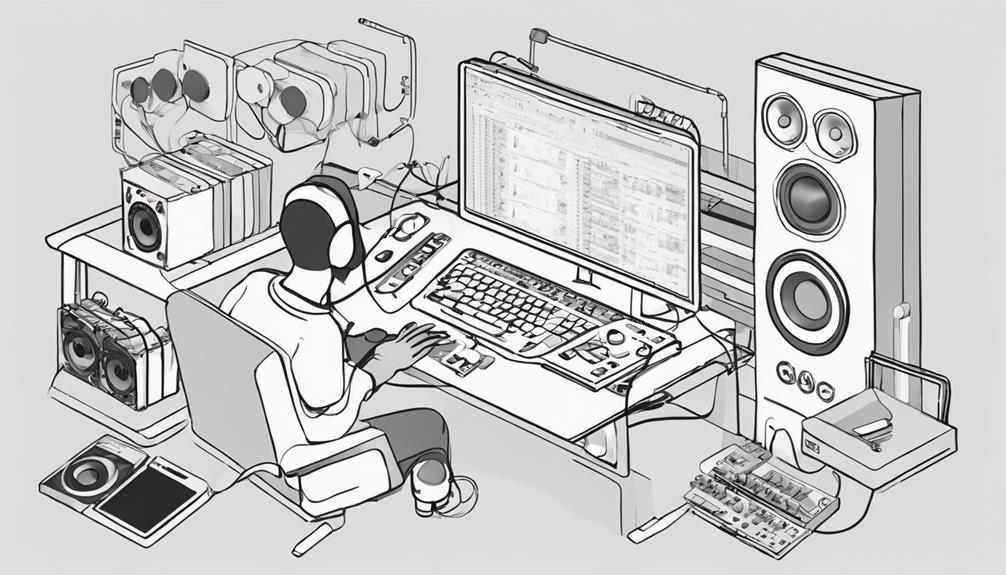
Make sure to carefully review the software requirements of your Digital Audio Workstation (DAW) to guarantee compatibility with your laptop's operating system. Ensuring software compatibility is vital for a seamless music production experience.
Here are some essential tips to keep in mind:
- Check the system requirements of your DAW to guarantee smooth operation on your laptop's OS.
- Verify that your laptop meets the minimum hardware requirements specified by your DAW for best performance.
- Ensure any plugins or virtual instruments you intend to use are compatible with both your DAW and operating system.
- Take into account using a Mac laptop for compatibility with software like Logic Pro X, which integrates well with macOS.
- Windows laptops offer a broader range of DAW options, providing flexibility for users with various software preferences.
Frequently Asked Questions
How to Use a Laptop for Music Production?
To make sure a laptop is suitable for music production, verify it meets specs, run a DAW, connect audio interfaces, MIDI controllers, update BIOS and drivers, and optimize settings. Enhance sound with external gear. Your laptop is your music studio!
Should I Use a Laptop for Music Production?
When it comes to music production, using a laptop offers flexibility, power, and portability. With the right specs, laptops can rival desktop setups. Embrace the freedom to create and produce music anywhere with a laptop.
What Laptops Do Professional Music Producers Use?
Professional music producers use high-performance laptops with top-tier CPUs like Intel Core i7 or AMD Ryzen 7, 16GB+ RAM, SSD storage, and sometimes dedicated graphics cards. Portability, durability, and battery life are key factors.
What Do You Need for a Music Production Laptop?
For a music production laptop, you need a powerful CPU like Intel Core i5 or AMD Ryzen 5, at least 8GB of RAM, SSD storage for fast data transfer, and USB-C connectivity for audio gear compatibility.
Conclusion
Now that you've got your laptop prepped and ready for music production, you're like a captain with a brand new ship, ready to sail the seas of creativity.
With the right tools and equipment, you're set to navigate through the waves of sound and bring your musical visions to life.
So grab your headphones, fire up your software, and let the music flow like a gentle breeze guiding you to your musical destination.
Smooth sailing ahead!

